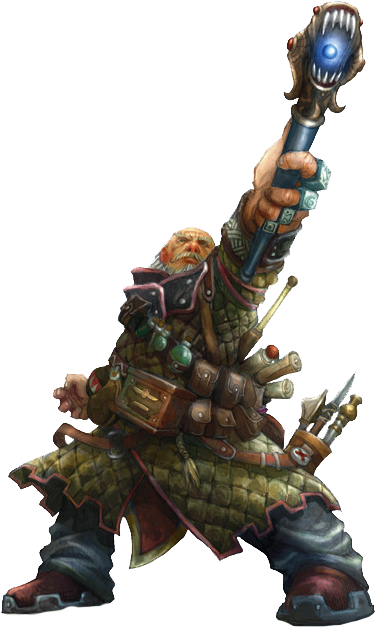Artificer

Note: The below describes a class not yet implemented in TOUD, and thus may change in its final implementation
In Eberron, magic is almost technology. Spellcasters specialize in certain forms of that technology, while artificers tinker with its fundamental workings. Artificers understand magic on a different level from spellcasters, and do not cast spells as wizards and clerics do. They have an amazing facility with magic items and constructs, and in many ways, they keep the magical world of Eberron running.
Artificers adventure for a variety of reasons. They seek deposits of rare minerals and dragonshards to use in their creations. They search for hidden arcane secrets related to making magic items or constructs. They face danger to acquire money to buy or make magic items. Like any other adventurers, they might also be motivated by a desire to fight evil or gain power, or by any of a host of similar reasons.
As the mists wash many adventurers up onto their shores, so too have Artificers and others from Eberron appeared within the Domain of Dread. While those that survive any length of time learn to hide their affinity for magic in domains like Barovia, or endear themselves to the powers that be, nonetheless enough of them have survived that there is a small niche for such dabblers, especially in Darkon, and Mordentshire.
Class Niche
Artificers are perhaps the ultimate magical dabblers. They can use just about any spell from a wand or scroll, empower ordinary items with temporary magical power, repair damaged constructs (including warforged), alter the function of existing magic items, and craft magic items, constructs, and dragonshard items. They have a limited list of their own spell-like infusions that they can apply to objects, and they can also work with any of the spells on other classes' spell lists. Their magic is neither arcane nor divine, and they are not bound by that classification: Their trade is magic in its most abstract (they might say purest) form.
In practical terms, Artificers are arcane magic users whom specialize in magic items specifically, and are well-suited to players whom prefer to craft but not lose out entirely on adventuring traits such as a relatively-decent Base Attack Bonus and saves, compared to the specialist Expert.
Alignment and Religion
If artificers have a tendency toward any alignment, it is neutral. They are more interested in their work than in its moral implications. Some artificers create magic items for the common good, while others seek to create items of tremendous destructive power.
Many Eberonnian artificers revere the deity Onatar, Lord of Fire and Forge. Others are too preoccupied with mastering magic - including divine magic - to worry about the gods who may or may not be the source of magic. Of natives, most Artificers whom do ascribe to a religion are associated with the Church of Ezra, Church of the Lawgiver, or the Eternal Order - though most are as irreligious and leaning towards atheistic as the rest of the core. Those whom do work for one of those churches, or another, do so often as armourers, or conservator of holy relics.
Artificers as Adventurers
Like wizards, artificers learn their craft through long years of hard study. They share a sense of camaraderie with others who have endured similar training. They view other artificers as either colleagues or rivals. Rivalry may take a friendly form as the artificers try to outdo each other in their creations and accomplishments, or it could turn deadly, with artificers sending construct assassins after each other.
Artificers work best when providing magical support to members of other classes. Though they are quite versatile, their talents lie in enhancing the items - weapons, armor, wands, and other gear - used by all the members of an adventuring party. They think of every party member as components of a machine, encouraging better teamwork within a group and sometimes providing strategy and tactics afforded by their unique mind-set.
In a typical adventuring party, artificers have a range of roles revolving around magic items. They bring an unparalleled flexibility to both using and creating such items. In a party that doesn't include a druid, for example, an artificer can use (or scribe) a scroll of barkskin or wield a staff of the woodlands. Though they can fight reasonably well, few artificers are inclined to engage in front-rank melee combat.
